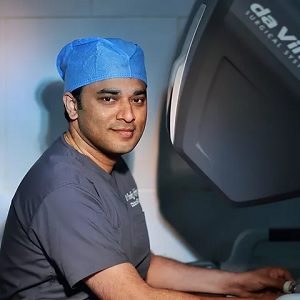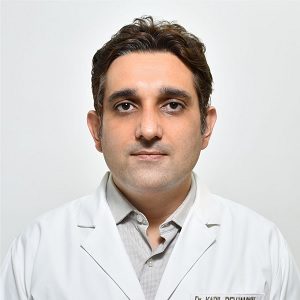Best Doctors in India for Whipple Procedure
- Liver Transplant Surgeon and HPB Surgeon, Chennai, India
- Over 15 years’ experience
Profile Highlights:
- Dr. Selvakumar Naganathan is one of the best liver transplant surgeons in India with nearly 15 years of experience.
- He has carried out more than 2000 procedures, including 300 donor & 500 recipient hepatectomies, cadaver transplantations, retrieval of cadaver livers, and live donor liver transplants.
- He also established many liver transplantation centers across India & other countries.
- General Surgeon and Surgical Gastroenterologist, Chennai, India
- Over 27 years’ experience
Profile Highlights:
- Dr. Raghunath K J is a well-known name in the field of general surgery with an experience of more than 27 years.
- He went under training in advanced Laparoscopic surgery from Canada and France.
- Dr. Raghunath pioneers many prestigious projects in the UK.
- Dr. Raghunath has a specialized interest in Gall Bladder Stone treatment, Hernia, GI Cancer Surgery, Laparoscopic Sleeve Resection, Endoscopic Surgery, etc.
- Colorectal Surgeon and Robotic Surgeon, Chennai, India
- Over 26 years’ experience
Profile Highlights:
- Dr. Venkatesh Munikrishnan is one of the best Gastroenterologists and Colorectal Surgeons in Chennai, having 21 years of experience in managing disorders that need surgical treatment.
- Dr. Munikrishnan specializes in surgical oncology, endoscopy, Gastritis Treatment, etc.
- He is also active in research; one of his research on CT Colonography fetched a grant from Bracco, Milan, Italy.
- GI Surgeon and Liver Transplant Surgeon, Gurugram, India
- Over 20 years’ experience
Profile Highlights:
- Dr. Amit Nath Rastogi is a pioneer in the field of liver transplant surgery. He completed his fellowship in liver transplant surgery at Sir Gangaram hospital while being a part of the largest liver transplant program in the country.
- Furthermore, he received his training in robotic liver surgery from IRCAD -Strasbourg, France, and advanced robotic HPB training from Grosseto.
- Liver Transplant Surgeon, Gurugram, India
- Over 10 years’ experience
Profile Highlights:
- Dr. Prashant Vilas Bhangui is one of the highly trained liver transplant specialists who received his training in Surgical Gastroenterology and Liver Transplantation.
- He also holds a European Inter-University Diploma in Hepato-Biliary-Pancreatic Cancers.
- Dr. Prashant is further interested to work in certain fields which include hepatocellular carcinoma, colorectal liver metastases, and living donor liver transplantation. Besides this, he has also published several journals on these subjects.
- Gastroenterologist, Gurugram, India
- Over 7 years’ experience
Profile Highlights:
- Dr. Abhinandan Mishra is one of the young Gastroenterology doctors in Gurugram who is particularly interested in inflammatory bowel disease treatment.
- Dr. Abhinandan Mishra offers Endoscopic Retrograde Cholangiopancreatography, Ascites tap, Endoscopy, Peroral Endoscopic Myotomy, Capsule Endoscopy, Esophageal Manometry, Magnetic Resonance Cholangiopancreatography, etc.
- Gastroenterologist, Gurugram, India
- Over 18 years’ experience
Profile Highlights:
- Dr. Atul Sharma is a renowned Gastroenterology practitioner in Gurugram and is particularly interested in Third Space Endoscopy and Per Oral Endoscopic Myotomy (POEM).
- He presented several papers on Manometry, Luminal gastroenterology, and interventional Gastroenterology during training in Advanced Interventional GI Endoscopy.
- Gastroenterologist, Gurugram, India
- Over 15 years’ experience
Profile Highlights:
- Dr. Kapil Jamwal is a renowned GI practitioner in Gurugram with an extensive experience in digestive and liver disease.
- The specialist offers treatment for Hepatitis B, Jaundice, Hepatitis C, Inflammatory Bowel Syndrome, Acute Pancreatitis, Liver Diseases, and Irritable Bowel Syndrome.
- Gastroenterologist, Gurugram, India
- Over 18 years’ experience
Profile Highlights:
- Dr. Rajesh Padhan is a renowned Gastroenterologist in Gurugram with an extensive experience of more than 18 years in the field.
- He is skilled in carrying out various endoscopy procedures such as Colonoscopy, Endoscopic retrograde cholangiopancreatography, Endoscopic ultrasound, upper GI endoscopy, etc.
- Gastroenterologist, Hepatologist, Gurugram, India
- Over 25 years’ experience
Profile Highlights:
- Dr. Sakshi Karkra is one of the best Pediatric gastroenterologists in Gurugram.
- She has special interest/ expertise in Colonoscopy, Upper GI Endoscopy, Capsule endoscopy, Enteroscopy, Endoscopic variceal ligation, Foreign body removal, Stricture & achalasia dilatation, Polypectomy, Anal manometry, Liver Biopsy, and Colonic manometry.
Best Hospitals in India for Whipple Procedure
Whipple Procedure
Whipple procedure or pancreaticoduodenectomy is a medical procedure involving the removal of the head of the pancreas, the duodenum (first part of the intestine), the bile duct and the gall bladder.
Doctors perform this complex operation to treat tumors and disorders related to the intestine, pancreas and the bile duct. It is the most common surgical procedure for the treatment of pancreatic cancer that does not extend beyond the head of the pancreas. After the procedure, your doctor will reconnect the remaining organs to allow easy digestion of the food you eat after the surgery. The Whipple procedure is a lifesaving procedure for people suffering from pancreatic cancer.
Who needs the Whipple procedure?
Approximately 25% of the patients suffering from pancreatic cancer need the Whipple procedure. This is mainly because the tumors of these patients remain confined to the pancreas (head of the pancreas) and do not spread to the surrounding blood vessels, lungs, liver and/or the abdominal cavity. One can go for intensive testing to understand he or she needs the Whipple procedure. In some cases, the doctors perform laparoscopic Whipple procedure by making several small incisions rather than a single large incision. Ultimately, there is lesser blood loss, quick recovery, a short stay at the hospital and fewer complications.
Around 40% of the patients are diagnosed with tumors when they spread beyond the pancreas and are not eligible for the Whipple procedure. However, it is an option rarely for 40% of the patients having a locally advanced disease that continues to spread to the nearby areas or for the patients whose tumors continue to spread to the tail or body of the pancreas.
When should you opt for the Whipple procedure?
Whipple procedure is an option for you if cancer of any other disorder affected your duodenum, pancreas or bile duct. The Whipple procedure is done for cancer for the removal of the tumor and to prevent the growth & spread of the tumor to the surrounding organs. Pancreas, present behind your stomach in the upper abdomen, works with the ducts and the liver carrying bile. The enzymes secreted by the pancreas held in the digestion of food. It also secretes hormones that help to regulate your blood sugar level. Your doctor will recommend the Whipple procedure to you if you have:
- Pancreatic cysts
- Pancreatitis
- Bile duct cancer
- Small bowel cancer
- Other disorders or tumors that involve your pancreas, bile ducts or duodenum.
- Pancreatic cancer
- Pancreatic tumors
- Ampullary cancer
- Neuroendocrine tumors
- Trauma to the small intestine or the pancreas
What to expect?
Before the procedure
You need to check-in and register on the day of the surgery. The staff at the hospital will confirm your appointment, procedure, timings and your appointed surgeon. Your nurse will ask you to change and wear a surgical gown for the surgery. Your doctor will put up an intravenous line (IV line) into the vein of your arm before the surgery. He or she will inject medications and fluid into your veins through the IV line. If you are nervous, then your doctor may also give you some medications to relax you. He or she may place you under an epidural catheter or a spinal injection apart from local nerve blocks in your abdominal wall. This helps in easier and faster recovery without causing any discomfort or pain to you after the surgery. This also decreases the amount of medication for narcotic pain that you may need.
During the procedure
The team will take all the necessary measures and follow all the protocols to ensure that you have effective and safe surgery. The team comprises of pancreatic surgeons, anesthesiologists & anesthetists, specialized surgical nurses, nurses and doctors trained for the surgery. They will administer anesthesia (sleeping medicine) to you.
After you sleep, the doctors will place additional intravenous lines along with other monitoring devices according to the complexity of the condition and your overall health. The team will then, insert a urinary catheter into your bladder. It will drain urine during the surgery and after the surgery. You can remove it after one to two days from the day of surgery. The surgery may require around 6-12 hours which depends on the approach the team is using and the complexity of the surgery. Done under general anesthesia, you will be unaware and fell asleep during the Whipple procedure.
Your surgeon will make an incision or cut in your abdomen to gain access to your internal organs. The size of the incision and its location will depend on the particular situation and the approach of your surgeon. Your surgeon will remove the duodenum (the beginning of the small intestine), the bile duct, the head of the pancreas and the gall bladder in the Whipple procedure. He or she may also remove a part of your stomach or the nearby lymph nodes. Your doctor may perform some other type of pancreatic operations also that depends on the situation.
After the procedure
Most of the people directly shift to the general ward after the surgery for their recovery. The team will monitor your condition and the improvements in your health regularly at various times of the day. Furthermore, they will carefully look out for any complications or signs of infection. Some people even get to walk out of the hospital on the day of the surgery. For your overall recovery, you may expect to stay at the hospital for a week. If your case is complex or you have certain medical conditions, the doctor will admit you to the ICU after the surgery. The nurses in the ICU will regulate your condition and watch for complications if any. The team will give you medications, fluids and nutrition through intravenous (IV) lines.
A urinary catheter will drain urine from the urinary bladder while other tubes will drain blood and fluid from the surgical area. People suffering from particular health conditions or old adults may need to stay in a rehabilitation facility for a few days. Many people can perform their routine activities within four to six weeks from the day of surgery. Your physical condition before the surgery and the complexity of the operation will govern the time required by you for recovery.
Risks
The Whipple procedure is a complex operation that involves open surgery in many cases. There are associated risks during and after the procedure. These risks may be:
- Infection at the site of the incision or within your abdomen
- Weight loss after the surgery
- Development of the fistulas or false channels
- Leakage from the connection of the bile duct or the pancreas
- Bleeding at the site of the surgery
- Diarrhea for two to three months
- Diabetes because of the removal of excess insulin-producing cells from the pancreas.
- Delayed stomach emptying which makes it difficult to keep food down or to eat.
If a highly experienced surgeon is performing the procedure then there are fewer chances of complications. You must ask your surgeon about his or her experience apart from their hospital’s experience regarding Whipple procedure and operations related to the pancreas.













